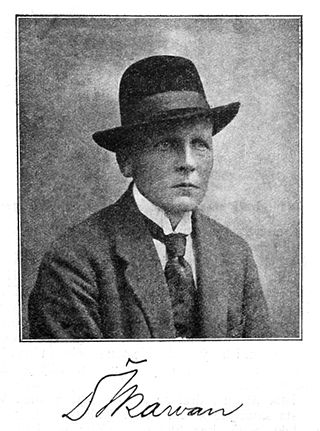
Esperanto is the world's most widely spoken constructed international auxiliary language. Created by L. L. Zamenhof in 1887, it is intended to be a universal second language for international communication, or "the international language". Zamenhof first described the language in Dr. Esperanto's International Language, which he published under the pseudonym Doktoro Esperanto. Early adopters of the language liked the name Esperanto and soon used it to describe his language. The word esperanto translates into English as "one who hopes".

Esperantujo or Esperantio is the community of speakers of the Esperanto language and their culture, as well as the places and institutions where the language is used. The term is used "as if it were a country."

L. L. Zamenhof developed Esperanto in the 1870s and '80s. Unua Libro, the first print discussion of the language, appeared in 1887. The number of Esperanto speakers have increased gradually since then, without much support from governments and international organizations. Its use has, in some instances, been outlawed or otherwise suppressed.

Esperanto symbols, primarily the Esperanto flag, have seen much consistency over the time of Esperanto's existence, though a few variations in exact flag patterning and symbology exist.

The Universal Esperanto Association, also known as the World Esperanto Association, is the largest international organization of Esperanto speakers, with 5,501 individual members in 121 countries and 9,215 through national associations in 214 countries La membraro de UEA en 2015, "Esperanto" 1301, april 2016, p. 94</ref> and in official relations with the United Nations. In addition to individual members, 70 national Esperanto organizations are affiliated with UEA. Its current president is Prof. Duncan Charters. The magazine Esperanto is the main publication to inform UEA members about everything happening in the Esperanto community.

Eugène Lanti was a pseudonym of Eugène Aristide Alfred Adam, an Esperantist, socialist and writer. He was a founder of Sennacieca Asocio Tutmonda, and a longtime editor of the internationalist socialist magazine Sennaciulo. Lanti was a critic of Stalinism and the theoretician of a new doctrine, anationalism, which aimed to eliminate the very concept of the nation as a guiding idea of social organisation.
Adjuvilo is a constructed language created in 1910 by Claudius Colas under the pseudonym of "Profesoro V. Esperema". Although it was a full language, it may not have been created to be spoken. Many believe that as an Esperantist, Colas created Adjuvilo to help create dissent in the then-growing Ido movement. Colas himself called his language simplified Ido and proposed several reforms to Ido.

Fundamento de Esperanto is a 1905 book by L. L. Zamenhof, in which the author explains the basic grammar rules and vocabulary that constitute the basis of the constructed language Esperanto. On August 9, 1905, it was made the only obligatory authority over the language by the Declaration of Boulogne at the first World Esperanto Congress. Much of the content of the book is a reproduction of content from Zamenhof's earlier works, particularly Unua Libro.
Finvenkismo is an ideological current within the Esperanto movement. The name is derived from the concept of a fina venko, denoting the moment when Esperanto will be used as the predominant second language throughout the world. A finvenkist is thus someone who hopes for or works towards this "final victory" of Esperanto. According to some finvenkists, this "final victory" of Esperanto may help eradicate war, chauvinism, and cultural oppression. The exact nature of this adoption, and what would constitute a "final victory" is often left unspecified.
The International Union of Catholic Esperantists is an organization of Catholic Esperanto speakers. It was founded in 1910 in Paris and is now headquartered in Rome.

Hector Hodler was a Swiss Esperantist who had a strong influence on the early Esperanto movement.

Vladimír von Szmurlo was a Russian Esperantist and railway engineer.
Ino Kolbe, born Ino Voigt, was a German Esperantist and author.
Ferdinand Jean Marie Valentin Duviard was a French high school teacher in Cahors, a writer and novelist. He became an Esperantist in 1905, wrote for many publications and was active in Esperanto youth groups. With Charles Pichon he co-founded Francan Federacion de Junaj Esperantistoj.

The World Esperantist Vegetarian Association is a voluntary association of Esperanto-speaking vegetarians. Founded in 1908, the group's working language is Esperanto, and it is the oldest international organization of vegetarians that is currently active. TEVA published a journal, Vegetarano ("Vegetarian") from 1914 to 1932, revived in 2009 as Esperantista Vegetarano, and has also operated a spirited Internet mailing list through Yahoo! Groups since 2005.

The Esperanto workers movement has the goal of taking practical advantage of the international language Esperanto for advancing the goals of the labour movement, especially the fight against unrestrained capitalism. It is not only a political movement in the strict sense but also a cultural and educational one. Currently the principal Esperanto associations active in the Esperanto workers movement at the global level are the Sennacieca Asocio Tutmonda and the Internacia Komunista Esperantista Kolektivo, and in a wider sense, the Monda Asembleo Socia.

The following outline is provided as an overview of and topical guide to Esperanto:

Esperanto was variously endorsed and oppressed in the Soviet Union throughout its history. The language was permitted by the government in the 1920s, but its internationalist nature brought it under scrutiny in the 1930s and Joseph Stalin enforced measures against the Esperanto community, having Esperanto speakers imprisoned and killed as part of the Great Purge. The Esperanto community was restored in the Soviet Union following the death of Joseph Stalin in 1953, but it did not achieve its earlier prominence.

Albert Škarvan was a Slovak physician, writer, translator, and Esperantist.













